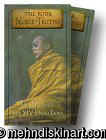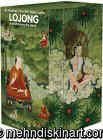 |
|
|
 4 Vol. Set |
The year one of the world's most
beloved spiritual teachers, the Dalai Lama, first prayed in Jerusalem and
Lourdes as an interfaith pilgrim, 1994 was also the year when he led an
historic discussion, "The Good Heart", for the tenth annual John Main
Seminar in London. At the seminar, the World community for Christian
Meditation brought Christians and Buddhists together to experience
enlightened dialogue between religions, conducted with respect, reverence,
humility, humor and the spirit of friendship. And for the first time, the
Dalai Lama commented extensively on the Christian Gospels as a Buddhist
monk, establishing a model for all future dialogue between the World's
religions. In this unprecedented video series, the Dalai Lama examines
well-known passages from each of the four Christian Gospels, providing a
unique reading of these familiar sources of faith. He insists on the need to
see the fundamental differences between Buddhism and Christianity, such as
over the idea of God. But he also highlights the "striking similarities and
parallels" between the lives of the founders, their teachings on
non-violence and the progressive stages of spiritual development. |
|

4 Vol. Set |
Besides
offering a thorough exposition of Mahayana belief, and indeed practice, with
an anything but common traversal of the Four Noble Truths by a master, in
these four videos one is invited to spend a few intimate hours in the
presence of the Dalai Lama, always an ennobling experience. The camera work
in this film is especially fine, making of the camera one's own eyes, as it
were, and lifting the hours even lighter than they already seem. With
respect to another of the reviews on this page, I found the necessary
translation from the stage handled superbly, and clearly with a great deal
of thought and natural reverence. In Thubten Jimpa, the Dalai Lama employs a
beautifully adept translator, an interpreter not only brilliantly attuned to
the words and thoughts of the Dalai Lama, but one so obviously loved by him,
and who responds with a special kind of faithfulness, that a marvelous duet
is often played out, only enhancing thereby this great teacher's magisterial
presentation. I would add that one feels as well the 'Englishness' of the
audience, so eager to quietly offer their accepting energy, so ready to
listen, far more so than might be a gathering of Americans usually so
conscious of themselves in the moment. The humor that ripples often between
the Dalai Lama and his listeners throughout the evening is so generous and
unaffected, one is returned again and again to the meaning behind the words,
the experience behind the event. This is a film of the highest achievement,
fortunately within the reach of us all. An unforgettable few hours! Read more |
|

| So
begins His Holiness the 14th Dalai Lama's 1999 dialogue on ethics to an
audience of 5,000 in Britain's Royal Albert Hall. As an internationally
respected Nobel Prize winner and as spiritual and political leader of Tibet,
the Dalai Lama is in a unique position to observe and comment on the West at
the turn of its millennium. At the same time, His Holiness works hard to
disclaim any special stature as a teacher and healer. He invites his
audience to have no expectations that he will transform their lives. His
talk is not one of how his listeners will be saved, but how they must save
others. His Holiness does see some positive signs at the end of the Western millennium: the spread of democracy and interest in human rights, for example. But he also sees the inevitability of future conflicts as the damage done in the 20th century around the world continues to bear its violent fruits for years to come. He is further troubled by the growing income disparity, even within the supposedly rich nations of the world. But His Holiness has hope for the 21st century, hope predicated on work. Nations must embrace disarmament, he says. They must devote themselves tirelessly to diplomacy. Finally, he expresses a strong belief that a reconciliation among the world's religions offers great hope for crossing cultural divides. The Dalai Lama is not one to rely on quiet asceticism, however, to solve intractable problems. Invited in the question-and-answer period to lead the audience in prayer, he instead offers a lesson on meditation to improve one's devotion to others, to better one's resolve to work compassionately for all beings. --Patrick O'Kelley Read more |
|

| One of
the world's most admired men, he is the spiritual and secular leader of a
nation that exists only in exile. Born Tenzin Gyatso, he is the fourteenth
man recognized by his people as Buddha's reincarnation and honored with the
title he is known by worldwide the Dalai Lama. Since 1959, when he fled his
nation after a failed rebellion against the occupying Chinese, he has lived
in exile. Follow the Dalai Lama from his childhood in the "Lost Kingdom" to
today. Interviews with Chinese scholars, Tibet activists including actor
Richard Gere and His Holiness himself detail the long struggle to free
Tibet. And see footage of the defining moments of his life including
accepting the 1989 Nobel Peace Prize. From a childhood in "Shangri-La" to a
life in exile, BIOGRAPHY presents the journey of His Holiness, the Dalai
Lama.
Read more |
|

| Every
year 4000 refugees take the arduous trek over the Himalayas to come to
Dharamsala in northern India, the home of the Tibetan Government-In Exile
and His Holiness, the Dalai Lama. While the Chinese government claims there
is no religious persecution in Tibet, in this insightful expose, the
refugees recount the torture and misery which led them to forsake their
family and country to flee into exile. Grammy award-winning singer Yungchen
Lhamo tells her family’s harrowing tale and is introduced for her concert in
Central Park by Buddhist scholar, Robert Thurman (Uma’s father).
Read more |
|

| Few people can speak with the spiritual authority of His Holiness the XIV Dalai Lama. His strength and loving but unwavering positions on war, economics, and population growth shine brightly in Human Rights and Moral Practice. This talk, given to a large audience at the University of California at Berkeley in 1996, is a clear exposition of his sentiments about right living and the vital importance of moral thinking as we adapt to our quickly changing world. Occasionally funny and always direct, His Holiness gives the rest of us hope that the best part of human nature will persevere and triumph. --Rob Lightner Read more | |

|
H.H. The Dalai Lama on Campus (1997) | |

| Filmed
in India, Secular Meditation is an introductory class to both the purpose
and process of meditation. Of course, the teacher, His Holiness the Dalai
Lama, teaches as much with his smiling eyes and laughter as with his words,
and the simple wisdom that he shares on this tape will appeal to Buddhists
and non-Buddhists alike.
The framework for the discussion cuts to the root of human experience. All
human beings, the Dalai Lama says, want to be happy. This desire transcends
all religions or sects, but what is the best way to find happiness? What
have our myriad branches of science, schools of philosophy, and spiritual
denominations taught us? In his analysis, His Holiness identifies mental and
physical happiness as being distinct, with mental happiness being more
important. He observes that even if one is physically fit and without
discomfort, mental distress can disrupt one's sense of painlessness.
Further, as scientists have shown, mental distress can actually cause the
deterioration of one's physical being. Therefore, one should pursue a state
of mental equanimity. But how does one actively bring peace to the mind?
That's where secular meditation comes in. In the final section of the tape,
His Holiness suggests several different ways to quiet the mind through
single-point meditation with breathing exercises or through the
contemplation of compassion. While these suggestions are just a start, they
are invaluable for viewers who have never tried meditation before. And for
the "experienced" Buddhist or meditator, the Dalai Lama's clear analytical
discussion of the path to the cessation of suffering will feel like an
energizing breeze that calls one back to "beginner's mind." --Patrick
O'Kelley
Read more |
|

| In
September, 1993, His Holiness the Dalai Lama spoke to an audience of 5000 in
Tucson, Arizona on the overcoming of anger through patience. This video is a
recording of this important teaching, entirely in the Dalai Lama's own
words. The Dalai Lama speaks of positive and negative desire and how through
training we can reduce anger and hatred and increase love and forgiveness.
Negative emotions are harmful not only for you but for the society and for
the future of the whole world. He speaks of the possibility for change and
transformation and of how in the changing of society, first must come the
change of the individual. The Dalai Lam talks of the many methods for
sustaining a calm mind and tells how in his own difficult circumstances he
does so.
Read more |
|

| The
Eight Verses on Transforming the Mind written by the eleventh century
meditator, Geshe Langri Tangpa Dorjey Sengey, is one of the most important
texts from a genre of Tibetan spiritual writings known as Lojong, literally
"training," or "transforming the mind." The central themes of Lojong are
enhancing compassion, cultivating balanced attitudes towards oneself and
others, developing positive ways of thinking, and transforming adverse
situations into conditions favorable for spiritual development. His Holiness
often refers to The Eight Verses as one of his main sources of inspiration.
He gave these teachings at the Wembley Conference Centre in London, May
8-10, 1999.
Read more |
|

| The Dalai Lama joins renowned journalists, economists, environmentalists and politicians in a discussion of the ethical dilemmas of the new millennium. Featuring: His Holiness the 14th Dalai Lama, Dr. Helen Caldicott, Amy Goodman, Dennis Kucinich, Susan Sarandon, Rev. Al Shapton, Russell Simmons, Robert Thurman Read more | |



